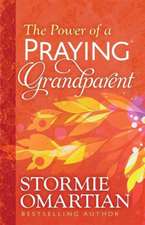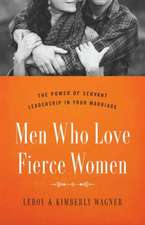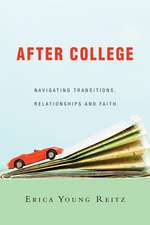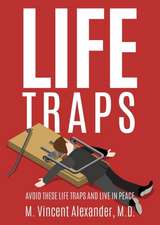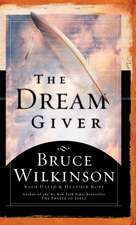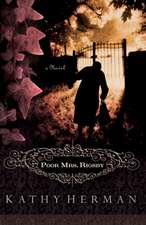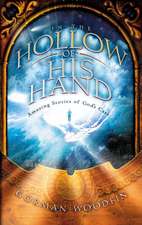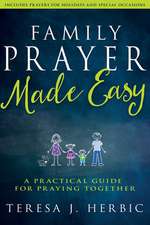With Endless Sight: Crossroads of Grace, cartea 03
Autor Allison K. Pittmanen Limba Engleză Paperback – 30 apr 2008
Belleville, Illinois and Wyoming Territories, 1861
Born into a life of privilege, fourteen-year-old Belinda never questions her security, even as she leaves Illinois with her family to discover new adventures in the Oregon Territory. But when disaster falls, Belinda is left wounded, weak, and alone. Her faith in God gives her the only strength she knows in a harsh new world.
Belinda’s journey takes her to a snow-covered mining camp and a red-roofed brothel in the Wyoming mountains, but not before she must spend a lonely winter with the man who took away the life she knew. Throughout the grief and hope of a strange land, Belinda must decide if her faith is big enough to allow her to forgive.
The satisfying conclusion to the Crossroads of Grace series, With Endless Sight offers a rich story of family, new beginnings, and the freedom that grace can bring.
Preț: 117.93 lei
Nou
Puncte Express: 177
Preț estimativ în valută:
22.57€ • 24.51$ • 18.96£
22.57€ • 24.51$ • 18.96£
Carte disponibilă
Livrare economică 02-16 aprilie
Preluare comenzi: 021 569.72.76
Specificații
ISBN-13: 9781601420121
ISBN-10: 1601420129
Pagini: 370
Dimensiuni: 131 x 204 x 26 mm
Greutate: 0.33 kg
Editura: Multnomah Books
Seria Crossroads of Grace
ISBN-10: 1601420129
Pagini: 370
Dimensiuni: 131 x 204 x 26 mm
Greutate: 0.33 kg
Editura: Multnomah Books
Seria Crossroads of Grace
Notă biografică
Allison Pittman is the award-winning author of Ten Thousand Charms and Speak Through the Wind. Before her recent success in fiction writing, Allison spent seventeen years teaching high school English. Now a full-time writer, Allison serves as the director of her church’s Theater Arts Group ministry. She lives in Texas with her husband, Mike, and their sons.
Extras
I wasn’t asleep—wasn’t even pretending to be—when my cousin Phoebe slipped into my room. She settled on the edge of my mattress, creating such an imbalance that I rolled toward her, giggling as our bodies collided.
“Shh!” Phoebe hissed into the shadows. “Do you want to wake the whole house?”
“Sorry,” I whispered.
“Do you have everything?”
I nodded. She gripped my hand with her soft, pudgy one and led me across my own bedroom floor. I held my other hand in front of me, gingerly searching out the familiar obstacles, and stopped when my fingers brushed the corner of my bureau.
“Wait.” I slipped my hand from her grip and took hold of the brass pulls of the top drawer. It opened smoothly, silently—trademark of a quality piece of furniture, Mama said—and I had to stretch up to my tiptoes to feel inside.
Normally I would be sifting through rolled stockings, cotton chemises, and ruffled pantalets, but all of those things were packed away. Now the drawer was empty, and after just a few searching pats my fingers closed around the stump of a tallow candle and the gilded handle of the mirror I had received as part of a matching set for my twelfth birthday.
“Let’s go.”
When we came to the top of the stairs, I transferred the stub of candle into the hand that was holding the mirror and used the other to grip the banister. I’d been running up and down these stairs at least twenty times a day for most of my life, but never in the dark. I gripped the varnished wood—slick enough to slide on if Mama wasn’t around—and used my toes to search out the edge of each step before moving down.
Phoebe was behind me, breathing down my neck, occasionally tapping her knees into my spine to hurry me along. Once safely on the ground floor, she brushed past me and took the lead, her white gown iridescent in the night shadows of my family home. It never occurred to me at the time to wonder why I was following her, why she took the lead in navigating through our front parlor, our morning room, our receiving hall. I suppose her frequent visits—sometimes lasting for weeks on end—made her feel less like a guest than did my other cousins, who were all gathered in what used to be our formal dining room.
Where twelve perfectly carved and upholstered high-backed chairs once stood, a litter of bedrolls and blankets covered the floor. When Phoebe and I walked into the room, the bundles sprang to life, and six girls were on their feet, hair streaming unplaited down their backs. They burst into whispered anticipa-
tion, then exchanged even louder admonitions to be quiet until Phoebe had to raise her voice to achieve silence.
“Is everybody ready?” Phoebe said. “Do you have your candles?”
“Yes, yes!” they chorused, first quite loud, then softer in response to Phoebe’s scolding finger. They held out little stubs of tallow for Phoebe’s approval.
“Come on, then.”
The pack of little girls—the youngest, Anne, not quite eight years old—followed us out of the dining room and into the kitchen. I handed Phoebe the mirror and candle, reached into the box on the shelf above the stove and took out a match, and drew it swiftly across the striking surface attached to the wall. The sulfurous odor lent an additional air of mystery to our little adventure, and the girls let out a collective gasp and shiver at the ordinary spark and light. I touched the flame to the stub of candle Phoebe held, then brought the match to my lips to blow it out.
“No,” Phoebe said.
“You can light the other candles off this one.” I was not happy about being in a power struggle in front of these younger girls.
“Each candle must have its own flame.” Her voice took on a deep, earthy quality, and I could sense the excited shivers of my younger cousins.
“It’s going to burn my fingers.”
“Only if we waste time arguing about it.”
“So we’ll stop arguing.”
I gave a decisive snap of my wrist, extinguishing the flame. The only light in the kitchen came from the candle Phoebe held close to her face, her pale skin now ghostly, her blond hair transparent.
“You’re going to ruin everything.” She shouldered in close so the other cousins wouldn’t hear.
“We shouldn’t be doing this anyway, and you know it,” I said, matching her tone. “Mother would skin us all alive if she knew.”
“That’s why nobody is going to tell her.” She slowly turned and faced the group. “Nobody’s going to tell anyone.”
The cousins took a collective step back, twelve wide eyes nodding in pale faces. Then she turned directly to me. “Now, what can we use to break the mirror?”
“Isn’t that bad luck?”
“Only if you believe it is.”
“I got this for my birthday.”
Phoebe leaned in close. “Listen, Belinda, you chicken out on me now, and I’ll march right upstairs, wake your mother, and tell her this was all your idea.”
I snatched the candle out of her hand and used it to light my search for any leftover tea towel and some heavy utensil not yet confiscated by a needy neighbor. I quickly found a scrap of cloth crumpled on top of the counter and a rusty potato masher left to languish in a drawer.
I offered these to Phoebe, who took them with the solemn air of a presiding priestess. As the girls craned to see over her shoulder, she placed the mirror on the kitchen counter, covered it with the cloth, and broke the glass with one decisive whack of the potato peeler’s handle. We all jumped back at that moment, as if expecting the shards to fly straight into our faces, but surged forward again when Phoebe removed the towel to reveal the broken mirror.
She gingerly poked around and handed me the largest piece.
“For your soul and your soul mate,” Phoebe said in that eerie voice she had affected just for this evening. She repeated the gift and the incantation until each—even the youngest—held a sharp-sided piece.
“Now, whoever goes first will have to be very, very brave. I’m sixteen, the oldest, but I can’t go because I'm holding”—she looked at me—“the first flame.”
“So Belinda’s next,” my cousins chorused, pointing at me. “She’s thirteen!”
“No! I, um…I gave the sacrifice of the looking glass.” I tried to sound as eerily authoritative as Phoebe. “In fact, I can choose not to participate at all.”
Before Phoebe could argue, Ida—just a month younger than I—stepped forward, holding out her candle stub. “I’ll go.”
“Very well.” Phoebe squared herself in front of Ida. “But remember, you must follow the instructions exactly. First, light your candle.”
Ida touched the black wick of her tallow stub to the flame.
“You must stand on the top step with your back to the cellar and say, ‘I descend into the darkness to see the face of my true love.’ ”
We all shivered at the word darkness.
“Then,” Phoebe continued, “you walk down the steps backward to symbolize that you are able to trust yourself. You mustn’t try to steady your steps by clinging to the wall or else you will never fall in love. Hold the candle and mirror in front of you. Do not look down or your husband will find an early grave. Do not look into the flame or your true love’s eyes will burn for another. You must look only into your own eyes, the reflection you see by the light of the candle. In this way, you are looking into your very soul.”
By the time she finished speaking, her voice was a mere whisper, and we all might have stood there in our little semicircle until dawn if Anne hadn’t piped up to ask, “Then what?”
"Then,” Phoebe said, her voice even deeper, “when you know you are on the cellar floor, without taking your eyes off your reflection, blow the candle out!”
We gasped.
“In that split second, before everything goes completely dark, you will see the face of your true love reflected in the glass.”
All of us, Phoebe included, burst into nervous giggles. When we had sufficiently hushed ourselves, Phoebe asked Ida if she was ready to take her journey down the steps.
“Yes,” Ida whispered.
She held her lit candle in front of her and walked toward the cellar door. It was closed but not locked, and there was an unspoken understanding that I was the one who should pull it open. Her candle illuminated only the top two steps; after that it was a dark, gaping maw. Ida looked terrified.
“You don’t have to do this if you don’t want to.” I gazed into her wide, staring eyes.
“We all promised we would,” Phoebe said in that bossy tone nobody ever seemed to have the will to fight against.
“I’m fine.” Ida positioned herself at the edge of the top step against a canvas of black and took a deep breath. “I descend into the darkness to see the face of my true love.”
Step by careful step, she drew away from us. We all gathered at the doorway, so close we could each feel the heartbeat of another. Nobody said a word, and Ida’s gaze never left its target. She grew smaller and smaller, the darkness seeming to crowd around her, then finally she stopped. We heard the sharp intake of her breath, and at once the tiny flame was gone, and Ida was consumed.
Silence, and then a voice from the abyss. “I saw him!”
The girls nearly threw themselves down the stairs, exhaling the common breath we all held. For the briefest moment, I doubted my own disbelief, wondering if there might be something to this voodoo falderol that Phoebe had roped us all into.
I made my way to the front of the crowd, cupped my hand to my mouth, and said, “Who’d you see?”
“Michael Foster!”
Phoebe caught my eye and sent me a look of smug confirmation, but I was nowhere near convinced. Cousin Ida had been talking about Michael Foster in her letters to me for at least three years. His father owned a textile mill that Michael would surely inherit. I met him once when we went up to visit. His hair stood on and like porcupine spikes and his hands were softer than mine, but Ida had her heart and mind set on marrying him. I would have been more surprised if she hadn’t seen his face in the glass.
Ida’s success infused all the girls with anticipation—except Anne, who insisted she was too little to have a true love. The honor next went to Lillian, who had just turned thirteen but had the face and figure of a much older girl. She and her family lived twenty miles away, and Mother often said she was glad because Lillian had all the earmarks of a girl who would grow up too fast, and a girl like that could ruin the reputation of an entire family.
As Lillian poised herself at the top of the stairs saying, “I descend into the darkness to see the face of my true love,” Phoebe elbowed me in the ribs and muttered something about being certain Lillian had descended into darkness before. I giggled and drew a reproachful glare from the other girls waiting their turn. When Lillian’s little light extinguished below, we once again leaned forward, waiting.
“I definitely saw someone,” she said, “but I couldn’t make out the face clearly. He had curly hair, though.”
“Maybe it’s someone you haven’t met yet,” Ida’s voice chimed in from the darkness.
“Maybe there’s just too many for the fates to choose from,” Phoebe said, and all of us upstairs laughed.
Next were the twins—first Violet, then Virginia—twelve years old and identical with the exception of the scars each one sported after an agreed-upon wounding to establish separate identities. Violet swore she saw a distinct face in the glass but refused to divulge a name until Virginia had descended. Nobody was surprised to learn that both girls saw the same face—some boy named Virgil who worked as a day laborer on a neighboring farm. The ensuing squabble might have lasted until dawn if a mysterious scuffle hadn’t brought it to an abrupt halt.
Then came Rachel, eleven, a level-headed girl who must have shared my skepticism about the night’s events. When she delivered her line about descending into the darkness, she did so in a warbled falsetto, dragging out the word love for at least the first three steps. When she hit the bottom and doused her candle, she swore she’d seen the face of Thomas Jefferson.
That left only Phoebe, little Anne, and me at the top of the cellar steps, and when Phoebe tried to maneuver the girl into her starting position, she was met with a swift kick in the shin.
“I said I didn’t want to!” Anne stamped her foot and settled her face in a determined pout.
“And I said you have to. Otherwise, you’ll be left up here all alone in the kitchen. Is that what you want? To be the only one in here when Uncle Robert comes down to see what all the ruckus is?” Phoebe’s uncle Robert was my father, and the thought of facing him in a dark kitchen in the middle of the night with a bevy of would-be witches tucked away in the cellar was not a soothing one. It was some kind of miracle that he hadn’t heard us at all—yet.
“What if we let Anne go down face forward?” I said. “Just let her keep her candle lit, walk down the stairs holding on to the wall, and join everybody else at the bottom.”
“Yeah. I don’t want no true love anyway. Boys stink.”
Phoebe rolled her eyes at the grand concession. “Just go.” I watched Anne make her way down the stairs, feeling guilty for having brought her into this mess. I also knew there was no way that little girl would be able to keep this a secret for long, and I hoped I would be deep into the Great Plains before she cracked.
“All right, Belinda.” Phoebe held out her candle to me. “Now it’s your turn.”
“Ah, Phoebe, you know I don’t believe any of this. It’s…it’s evil; it’s witchcraft.”
“It’s not witchcraft,” Phoebe said, her voice full of disdain. “It’s just, it’s—”
“Wrong. It’s just wrong. It’s sinful.”
“So you’re perfectly fine with letting the rest of us sin, but you’re too good?”
“You’re welcome to do what you want, but I can’t.”
“You promised.”
“I didn’t know what it would be like. I thought it would just be like the apple peels.” That was another of Phoebe’s favorites, peeling off a strip of apple skin and seeing what letter it formed when dropped into a dish of sugar. Mine was always a J; hers a C.
“This isn’t any different,” Phoebe said. “Besides, if you don’t believe, it won’t even work for you. It will just be a walk down some stairs.”
Compliance seemed to be the only way to bring this wretched night to a close, so I tipped my wick into Phoebe’s flame and stood at the mouth of the cellar.
“Idescendintothedarknesstoseethefaceofmytruelove.”
I could have cheated, could have stumbled into the wall and used it to guide me down, could have cast my eyes down to follow my feet, but once I saw my reflection, illuminated by that small flame, I had an overwhelming desire to know if what the other girls experienced was real. The piece of glass I held was almost a perfect triangle, curved slightly along its longest side, and it afforded me a full view of just one eye obscured by a few strands of long, loose hair. I kept my focus on that eye, seeing not my soul but something completely detached. A tiny flame dancing in a deep, dark orb.
The cellar steps were rough and cool beneath my bare feet—a marked change from the soft carpets of the house and the smooth finish of the kitchen floor. I put one foot gingerly down behind me, fought for balance, then brought down the other. I told myself I was just playing a game, appeasing my cousins, participating in a ritual as harmless as tossing spilled salt over my shoulder. The whispers petered into silence, and one final toe-reaching behind me confirmed that I was on solid ground. I took a deep breath and extinguished the flame.
And, nothing. Nothing but the darkness wrapped close around me. I kept my eye trained on the shard of mirror until the glowing tip of my candle’s wick was swallowed by black.
“Well?” The girls gathered around me, speaking as a chorus.
"I told you this was a bunch of nonsense,” I said, not allowing a drop of disappointment to come through.
“Or maybe you’re just never going to have a true love,” Phoebe said.
“Or maybe God knows the plans He has for me, and He’s not going to reveal them through some childish, evil game.”
“Aw, save your Scriptures for Sunday school.”
Phoebe positioned herself at the top of the stairs and intoned the fateful phrase with more conviction than any of us had mustered. I felt Anne’s small hand slip into mine. My failure to see an image hadn’t shaken their faith; with the exception of the goodhumored Rachel, they were believers. Phoebe came down the final step, and we took a collective step back. I heard her sharp intake of breath, then a puff into darkness.
Nobody broke into the silence that followed, but Anne did squeeze my hand a little tighter.
“Thank you, God,” Phoebe whispered.
“You leave God out of this.” I dropped Anne’s hand and shook my finger in the direction of Phoebe’s voice. “There’s nothing of God in this. It’s just—”
“You know who I saw, don’t you?”
“You didn’t see anybody. None of us did.”
“Who was it?” The eager voices of my cousins overrode my singular voice of reason.
“Chester,” Phoebe said.
“Cousin Chester?” Rachel said.
“Not by blood,” Phoebe said, reminding all of us of her adopted status—the very factor that gave her such mysterious appeal and power. “Now all of you get back upstairs.”
The girls shuffled their way back to the stairs, and excited whispers accompanied their ascent. I moved to join them, but was detained by a grip on my sleeve.
“Now do you see?”
“This doesn’t mean anything.”
“It changes everything.” Phoebe jerked me hard against her and stood so close I could feel her lips moving against my ear. “Talk to your father again. Tell him I have to go with you.”
“Shh!” Phoebe hissed into the shadows. “Do you want to wake the whole house?”
“Sorry,” I whispered.
“Do you have everything?”
I nodded. She gripped my hand with her soft, pudgy one and led me across my own bedroom floor. I held my other hand in front of me, gingerly searching out the familiar obstacles, and stopped when my fingers brushed the corner of my bureau.
“Wait.” I slipped my hand from her grip and took hold of the brass pulls of the top drawer. It opened smoothly, silently—trademark of a quality piece of furniture, Mama said—and I had to stretch up to my tiptoes to feel inside.
Normally I would be sifting through rolled stockings, cotton chemises, and ruffled pantalets, but all of those things were packed away. Now the drawer was empty, and after just a few searching pats my fingers closed around the stump of a tallow candle and the gilded handle of the mirror I had received as part of a matching set for my twelfth birthday.
“Let’s go.”
When we came to the top of the stairs, I transferred the stub of candle into the hand that was holding the mirror and used the other to grip the banister. I’d been running up and down these stairs at least twenty times a day for most of my life, but never in the dark. I gripped the varnished wood—slick enough to slide on if Mama wasn’t around—and used my toes to search out the edge of each step before moving down.
Phoebe was behind me, breathing down my neck, occasionally tapping her knees into my spine to hurry me along. Once safely on the ground floor, she brushed past me and took the lead, her white gown iridescent in the night shadows of my family home. It never occurred to me at the time to wonder why I was following her, why she took the lead in navigating through our front parlor, our morning room, our receiving hall. I suppose her frequent visits—sometimes lasting for weeks on end—made her feel less like a guest than did my other cousins, who were all gathered in what used to be our formal dining room.
Where twelve perfectly carved and upholstered high-backed chairs once stood, a litter of bedrolls and blankets covered the floor. When Phoebe and I walked into the room, the bundles sprang to life, and six girls were on their feet, hair streaming unplaited down their backs. They burst into whispered anticipa-
tion, then exchanged even louder admonitions to be quiet until Phoebe had to raise her voice to achieve silence.
“Is everybody ready?” Phoebe said. “Do you have your candles?”
“Yes, yes!” they chorused, first quite loud, then softer in response to Phoebe’s scolding finger. They held out little stubs of tallow for Phoebe’s approval.
“Come on, then.”
The pack of little girls—the youngest, Anne, not quite eight years old—followed us out of the dining room and into the kitchen. I handed Phoebe the mirror and candle, reached into the box on the shelf above the stove and took out a match, and drew it swiftly across the striking surface attached to the wall. The sulfurous odor lent an additional air of mystery to our little adventure, and the girls let out a collective gasp and shiver at the ordinary spark and light. I touched the flame to the stub of candle Phoebe held, then brought the match to my lips to blow it out.
“No,” Phoebe said.
“You can light the other candles off this one.” I was not happy about being in a power struggle in front of these younger girls.
“Each candle must have its own flame.” Her voice took on a deep, earthy quality, and I could sense the excited shivers of my younger cousins.
“It’s going to burn my fingers.”
“Only if we waste time arguing about it.”
“So we’ll stop arguing.”
I gave a decisive snap of my wrist, extinguishing the flame. The only light in the kitchen came from the candle Phoebe held close to her face, her pale skin now ghostly, her blond hair transparent.
“You’re going to ruin everything.” She shouldered in close so the other cousins wouldn’t hear.
“We shouldn’t be doing this anyway, and you know it,” I said, matching her tone. “Mother would skin us all alive if she knew.”
“That’s why nobody is going to tell her.” She slowly turned and faced the group. “Nobody’s going to tell anyone.”
The cousins took a collective step back, twelve wide eyes nodding in pale faces. Then she turned directly to me. “Now, what can we use to break the mirror?”
“Isn’t that bad luck?”
“Only if you believe it is.”
“I got this for my birthday.”
Phoebe leaned in close. “Listen, Belinda, you chicken out on me now, and I’ll march right upstairs, wake your mother, and tell her this was all your idea.”
I snatched the candle out of her hand and used it to light my search for any leftover tea towel and some heavy utensil not yet confiscated by a needy neighbor. I quickly found a scrap of cloth crumpled on top of the counter and a rusty potato masher left to languish in a drawer.
I offered these to Phoebe, who took them with the solemn air of a presiding priestess. As the girls craned to see over her shoulder, she placed the mirror on the kitchen counter, covered it with the cloth, and broke the glass with one decisive whack of the potato peeler’s handle. We all jumped back at that moment, as if expecting the shards to fly straight into our faces, but surged forward again when Phoebe removed the towel to reveal the broken mirror.
She gingerly poked around and handed me the largest piece.
“For your soul and your soul mate,” Phoebe said in that eerie voice she had affected just for this evening. She repeated the gift and the incantation until each—even the youngest—held a sharp-sided piece.
“Now, whoever goes first will have to be very, very brave. I’m sixteen, the oldest, but I can’t go because I'm holding”—she looked at me—“the first flame.”
“So Belinda’s next,” my cousins chorused, pointing at me. “She’s thirteen!”
“No! I, um…I gave the sacrifice of the looking glass.” I tried to sound as eerily authoritative as Phoebe. “In fact, I can choose not to participate at all.”
Before Phoebe could argue, Ida—just a month younger than I—stepped forward, holding out her candle stub. “I’ll go.”
“Very well.” Phoebe squared herself in front of Ida. “But remember, you must follow the instructions exactly. First, light your candle.”
Ida touched the black wick of her tallow stub to the flame.
“You must stand on the top step with your back to the cellar and say, ‘I descend into the darkness to see the face of my true love.’ ”
We all shivered at the word darkness.
“Then,” Phoebe continued, “you walk down the steps backward to symbolize that you are able to trust yourself. You mustn’t try to steady your steps by clinging to the wall or else you will never fall in love. Hold the candle and mirror in front of you. Do not look down or your husband will find an early grave. Do not look into the flame or your true love’s eyes will burn for another. You must look only into your own eyes, the reflection you see by the light of the candle. In this way, you are looking into your very soul.”
By the time she finished speaking, her voice was a mere whisper, and we all might have stood there in our little semicircle until dawn if Anne hadn’t piped up to ask, “Then what?”
"Then,” Phoebe said, her voice even deeper, “when you know you are on the cellar floor, without taking your eyes off your reflection, blow the candle out!”
We gasped.
“In that split second, before everything goes completely dark, you will see the face of your true love reflected in the glass.”
All of us, Phoebe included, burst into nervous giggles. When we had sufficiently hushed ourselves, Phoebe asked Ida if she was ready to take her journey down the steps.
“Yes,” Ida whispered.
She held her lit candle in front of her and walked toward the cellar door. It was closed but not locked, and there was an unspoken understanding that I was the one who should pull it open. Her candle illuminated only the top two steps; after that it was a dark, gaping maw. Ida looked terrified.
“You don’t have to do this if you don’t want to.” I gazed into her wide, staring eyes.
“We all promised we would,” Phoebe said in that bossy tone nobody ever seemed to have the will to fight against.
“I’m fine.” Ida positioned herself at the edge of the top step against a canvas of black and took a deep breath. “I descend into the darkness to see the face of my true love.”
Step by careful step, she drew away from us. We all gathered at the doorway, so close we could each feel the heartbeat of another. Nobody said a word, and Ida’s gaze never left its target. She grew smaller and smaller, the darkness seeming to crowd around her, then finally she stopped. We heard the sharp intake of her breath, and at once the tiny flame was gone, and Ida was consumed.
Silence, and then a voice from the abyss. “I saw him!”
The girls nearly threw themselves down the stairs, exhaling the common breath we all held. For the briefest moment, I doubted my own disbelief, wondering if there might be something to this voodoo falderol that Phoebe had roped us all into.
I made my way to the front of the crowd, cupped my hand to my mouth, and said, “Who’d you see?”
“Michael Foster!”
Phoebe caught my eye and sent me a look of smug confirmation, but I was nowhere near convinced. Cousin Ida had been talking about Michael Foster in her letters to me for at least three years. His father owned a textile mill that Michael would surely inherit. I met him once when we went up to visit. His hair stood on and like porcupine spikes and his hands were softer than mine, but Ida had her heart and mind set on marrying him. I would have been more surprised if she hadn’t seen his face in the glass.
Ida’s success infused all the girls with anticipation—except Anne, who insisted she was too little to have a true love. The honor next went to Lillian, who had just turned thirteen but had the face and figure of a much older girl. She and her family lived twenty miles away, and Mother often said she was glad because Lillian had all the earmarks of a girl who would grow up too fast, and a girl like that could ruin the reputation of an entire family.
As Lillian poised herself at the top of the stairs saying, “I descend into the darkness to see the face of my true love,” Phoebe elbowed me in the ribs and muttered something about being certain Lillian had descended into darkness before. I giggled and drew a reproachful glare from the other girls waiting their turn. When Lillian’s little light extinguished below, we once again leaned forward, waiting.
“I definitely saw someone,” she said, “but I couldn’t make out the face clearly. He had curly hair, though.”
“Maybe it’s someone you haven’t met yet,” Ida’s voice chimed in from the darkness.
“Maybe there’s just too many for the fates to choose from,” Phoebe said, and all of us upstairs laughed.
Next were the twins—first Violet, then Virginia—twelve years old and identical with the exception of the scars each one sported after an agreed-upon wounding to establish separate identities. Violet swore she saw a distinct face in the glass but refused to divulge a name until Virginia had descended. Nobody was surprised to learn that both girls saw the same face—some boy named Virgil who worked as a day laborer on a neighboring farm. The ensuing squabble might have lasted until dawn if a mysterious scuffle hadn’t brought it to an abrupt halt.
Then came Rachel, eleven, a level-headed girl who must have shared my skepticism about the night’s events. When she delivered her line about descending into the darkness, she did so in a warbled falsetto, dragging out the word love for at least the first three steps. When she hit the bottom and doused her candle, she swore she’d seen the face of Thomas Jefferson.
That left only Phoebe, little Anne, and me at the top of the cellar steps, and when Phoebe tried to maneuver the girl into her starting position, she was met with a swift kick in the shin.
“I said I didn’t want to!” Anne stamped her foot and settled her face in a determined pout.
“And I said you have to. Otherwise, you’ll be left up here all alone in the kitchen. Is that what you want? To be the only one in here when Uncle Robert comes down to see what all the ruckus is?” Phoebe’s uncle Robert was my father, and the thought of facing him in a dark kitchen in the middle of the night with a bevy of would-be witches tucked away in the cellar was not a soothing one. It was some kind of miracle that he hadn’t heard us at all—yet.
“What if we let Anne go down face forward?” I said. “Just let her keep her candle lit, walk down the stairs holding on to the wall, and join everybody else at the bottom.”
“Yeah. I don’t want no true love anyway. Boys stink.”
Phoebe rolled her eyes at the grand concession. “Just go.” I watched Anne make her way down the stairs, feeling guilty for having brought her into this mess. I also knew there was no way that little girl would be able to keep this a secret for long, and I hoped I would be deep into the Great Plains before she cracked.
“All right, Belinda.” Phoebe held out her candle to me. “Now it’s your turn.”
“Ah, Phoebe, you know I don’t believe any of this. It’s…it’s evil; it’s witchcraft.”
“It’s not witchcraft,” Phoebe said, her voice full of disdain. “It’s just, it’s—”
“Wrong. It’s just wrong. It’s sinful.”
“So you’re perfectly fine with letting the rest of us sin, but you’re too good?”
“You’re welcome to do what you want, but I can’t.”
“You promised.”
“I didn’t know what it would be like. I thought it would just be like the apple peels.” That was another of Phoebe’s favorites, peeling off a strip of apple skin and seeing what letter it formed when dropped into a dish of sugar. Mine was always a J; hers a C.
“This isn’t any different,” Phoebe said. “Besides, if you don’t believe, it won’t even work for you. It will just be a walk down some stairs.”
Compliance seemed to be the only way to bring this wretched night to a close, so I tipped my wick into Phoebe’s flame and stood at the mouth of the cellar.
“Idescendintothedarknesstoseethefaceofmytruelove.”
I could have cheated, could have stumbled into the wall and used it to guide me down, could have cast my eyes down to follow my feet, but once I saw my reflection, illuminated by that small flame, I had an overwhelming desire to know if what the other girls experienced was real. The piece of glass I held was almost a perfect triangle, curved slightly along its longest side, and it afforded me a full view of just one eye obscured by a few strands of long, loose hair. I kept my focus on that eye, seeing not my soul but something completely detached. A tiny flame dancing in a deep, dark orb.
The cellar steps were rough and cool beneath my bare feet—a marked change from the soft carpets of the house and the smooth finish of the kitchen floor. I put one foot gingerly down behind me, fought for balance, then brought down the other. I told myself I was just playing a game, appeasing my cousins, participating in a ritual as harmless as tossing spilled salt over my shoulder. The whispers petered into silence, and one final toe-reaching behind me confirmed that I was on solid ground. I took a deep breath and extinguished the flame.
And, nothing. Nothing but the darkness wrapped close around me. I kept my eye trained on the shard of mirror until the glowing tip of my candle’s wick was swallowed by black.
“Well?” The girls gathered around me, speaking as a chorus.
"I told you this was a bunch of nonsense,” I said, not allowing a drop of disappointment to come through.
“Or maybe you’re just never going to have a true love,” Phoebe said.
“Or maybe God knows the plans He has for me, and He’s not going to reveal them through some childish, evil game.”
“Aw, save your Scriptures for Sunday school.”
Phoebe positioned herself at the top of the stairs and intoned the fateful phrase with more conviction than any of us had mustered. I felt Anne’s small hand slip into mine. My failure to see an image hadn’t shaken their faith; with the exception of the goodhumored Rachel, they were believers. Phoebe came down the final step, and we took a collective step back. I heard her sharp intake of breath, then a puff into darkness.
Nobody broke into the silence that followed, but Anne did squeeze my hand a little tighter.
“Thank you, God,” Phoebe whispered.
“You leave God out of this.” I dropped Anne’s hand and shook my finger in the direction of Phoebe’s voice. “There’s nothing of God in this. It’s just—”
“You know who I saw, don’t you?”
“You didn’t see anybody. None of us did.”
“Who was it?” The eager voices of my cousins overrode my singular voice of reason.
“Chester,” Phoebe said.
“Cousin Chester?” Rachel said.
“Not by blood,” Phoebe said, reminding all of us of her adopted status—the very factor that gave her such mysterious appeal and power. “Now all of you get back upstairs.”
The girls shuffled their way back to the stairs, and excited whispers accompanied their ascent. I moved to join them, but was detained by a grip on my sleeve.
“Now do you see?”
“This doesn’t mean anything.”
“It changes everything.” Phoebe jerked me hard against her and stood so close I could feel her lips moving against my ear. “Talk to your father again. Tell him I have to go with you.”
Recenzii
“With Endless Sight paints an unforgettable story about the power of love and a young girl’s gritty determination to remain true to God. This stunningly beautiful novel is written with an emotional depth that will touch your heart and remain with you forever.”
- Nancy Jo Jenkins, author of Coldwater Revival
“With Endless Sight sets a tender story against the harsh frontier landscape. Allison Pittman writes the kind of lush details that pull you into another time and place. She’s definitely earned herself a spot on my must-read list!”
- Allie Pleiter, author of My So-Called Love Life
“Once again Allison Pittman has painted a masterpiece with words. With the deft brushstrokes of a master storyteller, Pittman’s canvas is filled with characters and places that will live on long after the last page has been turned. With Endless Sight is not to be missed, for to do so would be to miss an opportunity to see the grace and love of God working through the simple yet complicated faith of those who choose to love Him even in the hardest moments.”
- Kathleen Y'Barbo, best-selling author of Beloved Castaway
“In Speak Through the Wind, Allison Pittman guides her heroine down the dark alleys of New York and through the bustling streets of San Francisco on a harrowing journey toward wholeness. Carefully chosen details and realistic dialogue bring the gritty scenes to life as Kassandra spirals downward, even as her day of redemption draws near.”
- Liz Curtis Higgs, best-selling author of Grace in Thine Eyes
“While Speak Through the Wind is beautifully written, wonderfully moving, and a testament to God’s love, it suffers from the following: It is highly incompatible with mascara (waterproof or otherwise), getting one’s children to school ahead of the tardy bell, and putting dinner on the table. I simply could not put it down.”
- Tamara Leigh, author of Perfecting Kate and Splitting Harriet
“Pittman beautifully articulates the depths of despair and hopelessness that often arrive with disappointment and loss. Her knowledge of history combined with the human component of injustice and suffering is what makes Speak Through the Wind so engaging and compelling. The ultimate message of God’s love and redemption leaves the reader uplifted and encouraged.”
- Romantic Times Magazine
“Allison Pittman is absolutely one of the best writers I have encountered this year. Her writing style presents you with memorable characters who grab hold of your heart. ”
- MyShelf.com for Speak Through the Wind
“Ten Thousand Charms is a terrific tale of love and redemption that grabs you and won’t let go. It will leave you like it left me, anxious to see this author’s future work.”
- James Scott Bell, best-selling author of Presumed Guilty
“If you took Francine Rivers’s classic Redeeming Love and merged it with Janette Oke’s quaint, prairie style, you could almost envision the masterpiece Allison Pittman has created with her poignant tale of God’s redemptive power. If you’re in need of a fresh touch of God’s grace, Ten Thousand Charms is the story for you.”
- Janice Thompson, author of Hurricane
- Nancy Jo Jenkins, author of Coldwater Revival
“With Endless Sight sets a tender story against the harsh frontier landscape. Allison Pittman writes the kind of lush details that pull you into another time and place. She’s definitely earned herself a spot on my must-read list!”
- Allie Pleiter, author of My So-Called Love Life
“Once again Allison Pittman has painted a masterpiece with words. With the deft brushstrokes of a master storyteller, Pittman’s canvas is filled with characters and places that will live on long after the last page has been turned. With Endless Sight is not to be missed, for to do so would be to miss an opportunity to see the grace and love of God working through the simple yet complicated faith of those who choose to love Him even in the hardest moments.”
- Kathleen Y'Barbo, best-selling author of Beloved Castaway
“In Speak Through the Wind, Allison Pittman guides her heroine down the dark alleys of New York and through the bustling streets of San Francisco on a harrowing journey toward wholeness. Carefully chosen details and realistic dialogue bring the gritty scenes to life as Kassandra spirals downward, even as her day of redemption draws near.”
- Liz Curtis Higgs, best-selling author of Grace in Thine Eyes
“While Speak Through the Wind is beautifully written, wonderfully moving, and a testament to God’s love, it suffers from the following: It is highly incompatible with mascara (waterproof or otherwise), getting one’s children to school ahead of the tardy bell, and putting dinner on the table. I simply could not put it down.”
- Tamara Leigh, author of Perfecting Kate and Splitting Harriet
“Pittman beautifully articulates the depths of despair and hopelessness that often arrive with disappointment and loss. Her knowledge of history combined with the human component of injustice and suffering is what makes Speak Through the Wind so engaging and compelling. The ultimate message of God’s love and redemption leaves the reader uplifted and encouraged.”
- Romantic Times Magazine
“Allison Pittman is absolutely one of the best writers I have encountered this year. Her writing style presents you with memorable characters who grab hold of your heart. ”
- MyShelf.com for Speak Through the Wind
“Ten Thousand Charms is a terrific tale of love and redemption that grabs you and won’t let go. It will leave you like it left me, anxious to see this author’s future work.”
- James Scott Bell, best-selling author of Presumed Guilty
“If you took Francine Rivers’s classic Redeeming Love and merged it with Janette Oke’s quaint, prairie style, you could almost envision the masterpiece Allison Pittman has created with her poignant tale of God’s redemptive power. If you’re in need of a fresh touch of God’s grace, Ten Thousand Charms is the story for you.”
- Janice Thompson, author of Hurricane
Descriere
In the final book in the Crossroads of Grace series, Belinda must decide whether faith will free her to forgive the one who hurt her most, when she is left without family or hope.


